Nagasaki, Japan is no doubt best known as the site of the second atomic bombing on August 9, 1945.
The Peace Garden commemorates that tragic event in a beautiful and hopeful place.
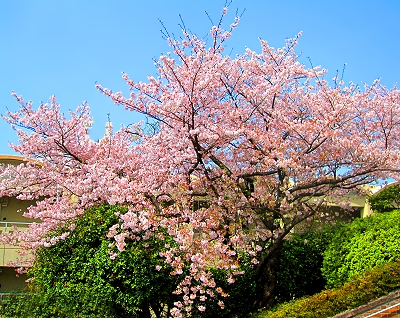
Spring was in full bloom, so the path up the hill to The Peace Garden was brilliantly lined with flowers and the cherry blossoms were reaching their peak.
A remarkable sight anywhere, but made even more remarkable since many scientists predicted that no vegetation would grow on this ground for seventy-five years because of the radioactive fallout.
See more about the significance of the cherry blossoms in Japan
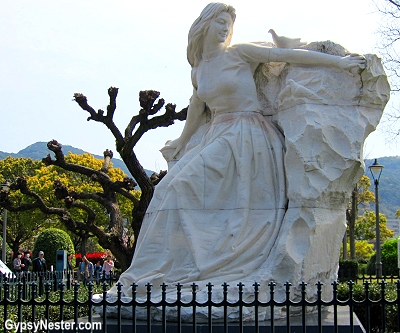
Monuments, given from cities and countries all around the globe to demonstrate their commitment to world peace, line the walkways that lead to The Fountain of Peace.
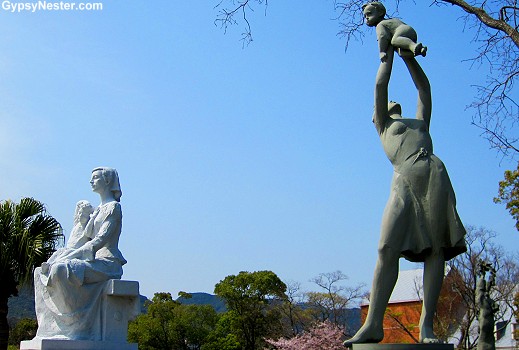
More about beautiful, peaceful Nagasaki
The fountain’s spraying water forms dove’s wings as a symbol of peace. Water has an emotional attachment to this memorial because so many died due to the lack of any drinkable water.
This was most poignantly brought to our attention by the inscription on the fountain. Sachiko Yamaguchi, a girl only nine years old at time of the bombing, wrote:
“I was thirsty beyond endurance. There was something oily on the surface of the water, but I wanted water so badly that I drank it just as it was.”
We were touched by a survivor who invited us to water his plant as an offering to world peace.
Deeply honored, tears poured down Veronica’s cheeks as she took up the ladle and read the translation of his amazing story.
“I would have died unless my boss had told me to do that irregular job of fixing parts in the other building. We were transferring to the new workplace.
The atomic bomb exploded 1.1 kilometers from my workshop of Mitsubishi Arsenal Co. Ohashi Factory.
The bomb blast blew me away 1.4 meters from my job site. Luckily I was behind the huge pillar that helped to save my life.
Survived were only two of us out of the 32 workers. All the rest perished.
As an atomic bomb survivor I want people throughout the world to know how horrible the atomic bombing was and how valuable peace is.”
The garden is built on the site of the Urakami branch of Nagasaki Prison where one hundred and thirty four people died.
The wall surrounding the prison was over twelve feet high and made from steel-reinforced concrete.
Reduced to nearly the foundation, the remains have been left in the garden.
More about beautiful, peaceful Nagasaki
Opposite the Fountain of Peace, the park is dominated by a huge statue known as The Prayer Monument for Peace.
Towering thirty feet high, it was erected on August 9, 1955, the tenth anniversary of the explosion.
The mammoth figure has his right hand extended upwards toward where the bomb fell, and his left outstretched in a gesture of peace. His eyes are closed in prayer.
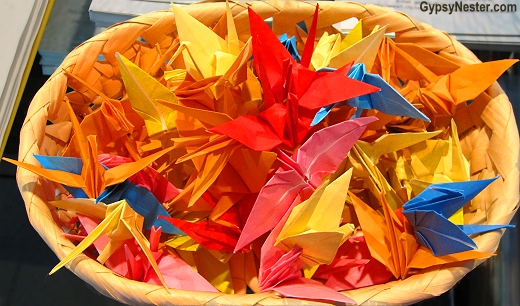
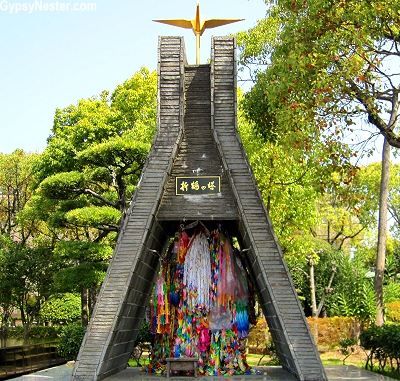
It’s hard to say how long we spent taking in the garden because there is a timeless, almost dreamlike quality to the memorial and we had great difficulty sorting out our emotions.
One thing we can say for certain, the park was incredibly successful at conveying its message of peace.
David & Veronica, GypsyNester.com
More about beautiful, peaceful Nagasaki
Click here for our full live-blog as we traveled with Holland America aboard the ms Volendam – through Hong Kong, China, South Korea and Japan!


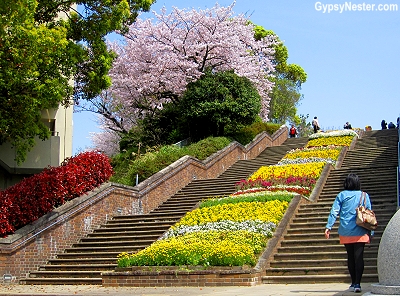
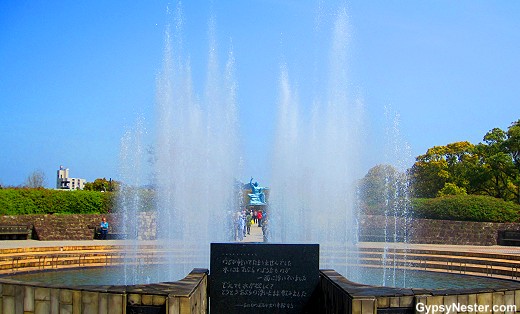
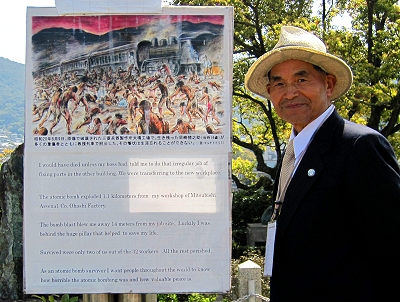
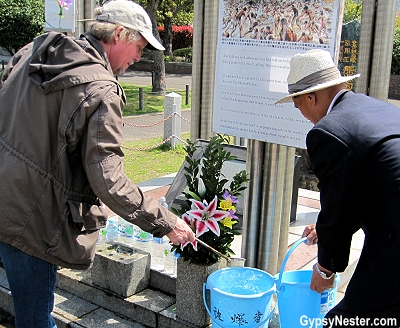
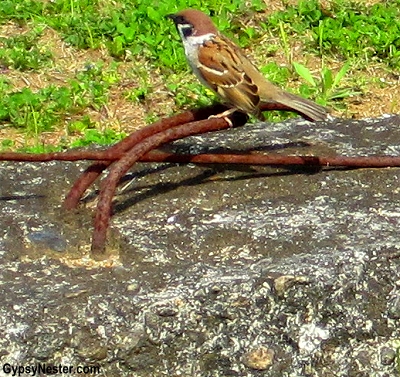
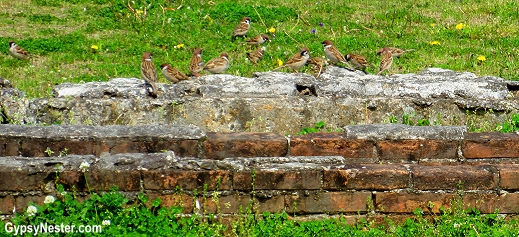
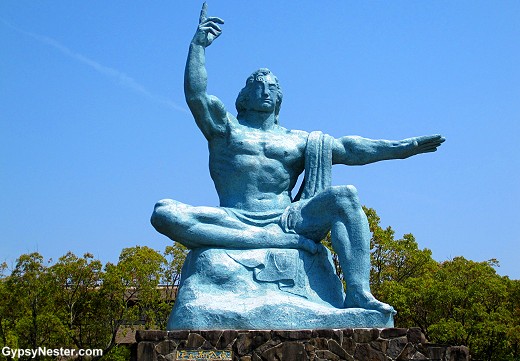
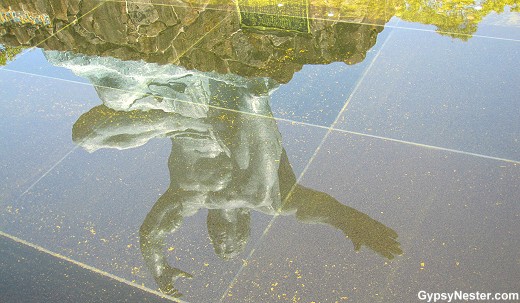

We never want to see again the events that drove the Allied political decisions for such terrible firebombing and atomic bombing of Japan’s cities and her citizens – thus we also do not want to see the atrocities like what happened to the citizens in Nanjing, Hong Kong, Kuching, Sandakan, Malaya, Singapore, Banka Island, Changi, Outram Road, Bataan, villages in Papua New Guinea, what is now Indonesia but was the Dutch East Indies, and in so many other places under the Japanese WW2 East Asian Co Prosperity Zone to ever ever happen again – because it drives the use of such terrible weapons.
To turn such a disaster in such a positive direction was indeed a bold step.
I hope that Japan’s example of not having aggressive armed forces is accepted by other countries around the world.
We can hope.
Touching and very thought provoking. Thanks for sharing.
Glad to, it was.
A touching post. Its testament to the locals to turn this into such a beautiful place
Thanks Dan, very true.
Thank you for sharing this. I’m sure your experience was remarkable. It is amazing how they turned such a negative event into a positive memorial.
Remarkable is the right word, it was.
What a beautiful way to remember such a horrible event in Japanese/US history.
It was a very moving experience.